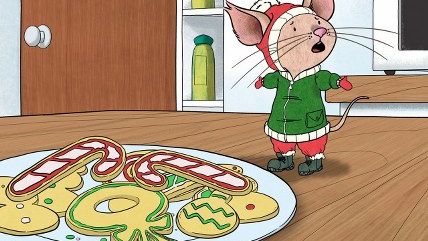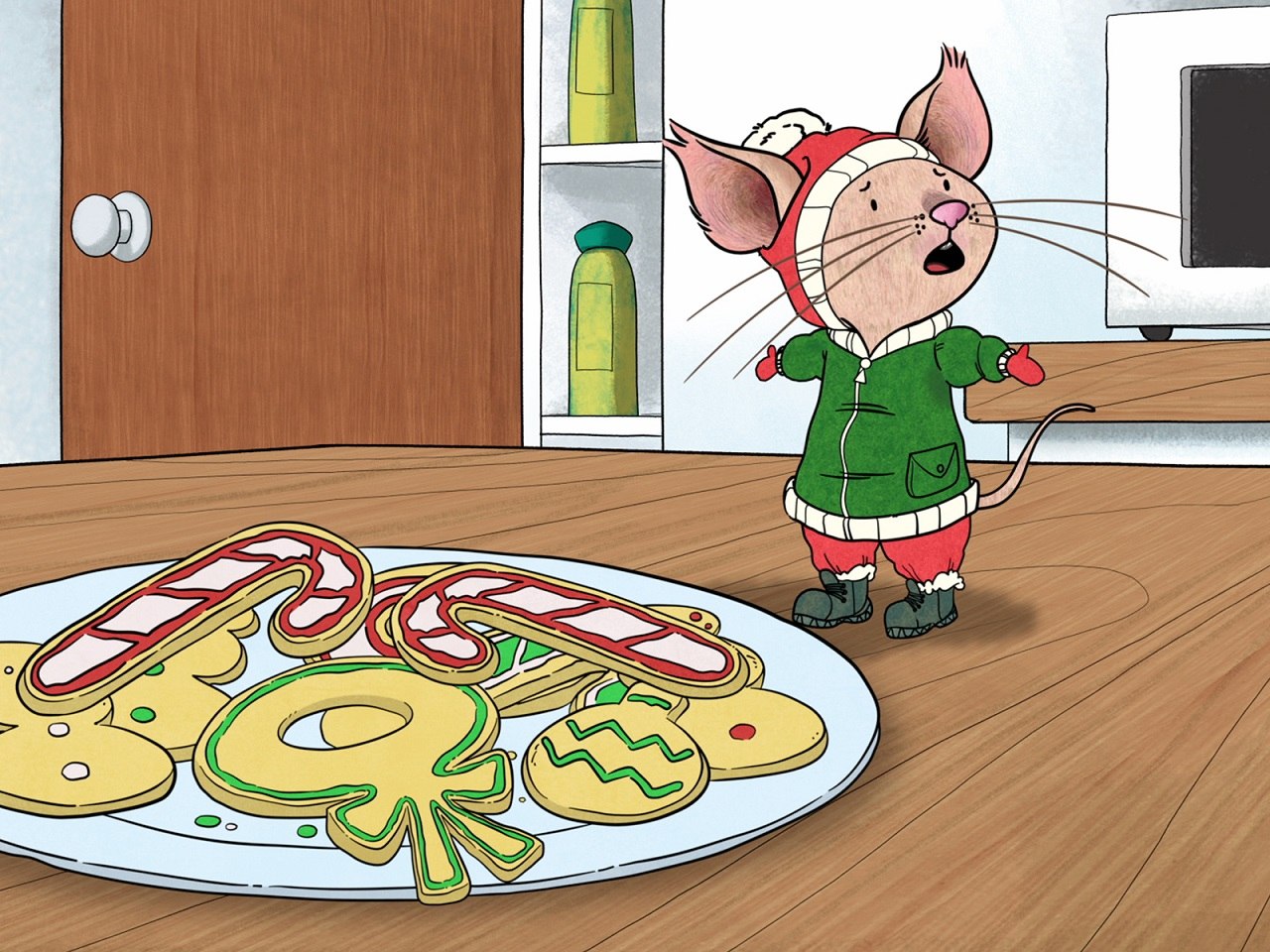Amazon Delivers Trio of Trite Christmas Stories
Prime for mockery.


If You Give a Mouse a Christmas Cookie. Available Friday, November 25, on Amazon Prime.
The Snowy Day. Available Friday, November 25, on Amazon Prime.
An American Girl Story – Maryellen 1955: Extraordinary Christmas. Available Friday, November 25, on Amazon Prime.
I used to eagerly await the annual crop of Christmas movies and TV shows. And I still light up with a soft glow like a bulb on the tree when I watch the seasonal classics of my childhood. Who can resist watching dull little Bedford Falls transformed into the glorious, neon-lit hookers-and-pawnshops urban landscape of Pottersville in It's A Wonderful Life? Or sniffling away a sad tear or two at the martyrdom of the visionary Mr. Potter in the film's lost ending? Whether it was yuletide zombies, ill-mannered Norwegians, or a jolly Santa Claus blasting Satan in the butt with a cannon, I was endlessly enchanted.
But those days have passed. Today's children being the overprotected little snowflake dorks they are, Christmas shows for them are nightmarish descents into robotic multicultural tedium that make me long for the bony embrace of the best Ghost of Christmas Future ever in Mr. Magoo's Christmas Carol.
Amazon Prime has appointed itself the Official Network of Christmas Lobotomization this year, releasing three heinous little shows that parents can prop their kids (or, possibly, tie them down) in front of as they join the Black Friday throngs overrunning shopping malls.
If You Give a Mouse a Christmas Cookie is an animated version of Merry Christmas, Mouse, part of a line of children's books that started in the mid-1980s with If You Give a Mouse a Cookie and then devolved into a series of increasingly horrifying tales of vermin entitlement that led through cookies, muffins, pancakes, and movie tickets, ending, probably, in the not-too-distant future with If You Give a Mouse Full Second Amendment Rights.
The plot, such as it is, consists of an anthropomorphic rodent gnawing on a Christmas cookie, then rampaging around first a house and then a school in the grips of an acute Noelian psychosis, breaking stuff and spouting aphorisms ("If your friend gets stuck in a barn on Christmas Eve, then you gotta get him out no matter what") that the Developmental Psychology Police apparently believe are indispensible to living a useful life. There are lots of original songs, the most melodious and spiritually sensitive recorded since the final, dying starburst of rock'n'roll in 1970. Eventually the mouse is joined by a similarly inclined pig, dog, moose and just about every other other anthropoid ever animated short of South Park's Mr. Hankey, the singing, dancing Christmas Poo.
Even the most simple-minded kid (and of course I'm referring to your neighbor's kid, not yours) is likely to find this lethally boring after about the first five minutes. If You Give a Mouse a Christmas Cookie does threaten to lapse into mild interestingness for a moment about midway through when the mouse asks the boss at a Christmas-tree lot for a free tree. "I'm a tree salesman, not a tree-giver-awayer," he snaps, but then, naturally, is so mortified at the cruel vision of a mouse without its own Christmas tree that he erupts into a fit of altruism that would cause Ayn Rand to set her own hair on fire. My only comfort was the possibility that the Health Nazis, horrified at the specter of children sharing their cookies with epidemical vectors, will launch their own series of playful specials: When a Mouse Gives You Bubonic Plague, When a Mouse Gives You Hantavirus… .
The Snowy Day, Amazon Prime's other animated Christmas special, is based on the groundbreaking 1962 children's picture book about a little boy experiencing small adventures as he wanders around a snowed-under Brooklyn on Christmas Eve. Though the text didn't mention it, the illustrations made it clear that Peter was black, the first African-American protagonist in a full-color picture book.
Back then the book was widely admired and won a Caldecott Medal, the Nobel of children's literature. Today, authored by middle-aged white writer-illustrator Ezra Jack Keats, it would probably come under scathing attack for cultural appropriation. The producers of the cartoon have done something almost as bad: They've turned it into a monument to political correctness.
Peter's journey to his grandmother's house to retrieve the main course of the family's traditional macaroni-and-cheese Christmas Eve dinner turns into an odyssey through Benetton Hell. The little Jewish girl. The elderly Chinese grocer. The snowball-war crew of Hispanics. And a cryptically unexplained Arab named Ahmed. After the predictable disaster that obliterates the mac-and-cheese, everybody shows up at Peter's house carrying their festive native dishes, from latkes to tamales to long-life noodles. Everybody, that is, except for the mysterious Ahmed. Not that that mars the message of The Snowy Day, which is that most world cultures are way ahead of us in realizing that mac-and-cheese is inedible swill.
An American Girl Story – Maryellen 1955 isn't animated, and I mean that in more ways than one. It's the dozenth or so in a series of TV movies, straight-to-video DVDs and theatrical releases based on a line of dolls from various periods in American history. Movies and TV shows derived from merchandise used to be considered original sin by progressive child-rearing forces, but American Girl gets a pass for its feminist trappings, which usually consist of repeating some variant of "a girl can do anything she wants, even be president or at least the mad destroyer of Libya!" about 10 times an hour.
Set in—you guessed it—1955, Maryellen 1955 stars soap opera kiddie actress Alyvia Alyn Lind as a little girl who wants to wear pants in public (pioneering feminist quotient: Off the charts!) and repaint doors red. (Pioneering feminist quotient: Uncertain. I mean, is Take Your Daughter To Repaint The Door Day a thing?)
In between energetically lobbying her tragically unenlightened mom (Mary McCormack, House of Lies) on these issues, Maryellen has an epiphany: She should do something nice for her polio-stricken cousin, who's in the hospital awaiting surgery. As epiphanies go, this one seems a tad mild, since Maryellen had polio herself and knows exactly what it's like, but come on, get with the program.
Or better yet, don't. Maryellen 1955's ridiculous focus on imaginary paint-box fascism masks the real problems of the 1950s, sometimes in a way that seems deliberate. The show takes place in a pleasantly integrated Daytona Beach, at a time when Florida was really, culturally and legally, part of the Deep South. As late as 1965, Muhammad Ali needed a special pass to go Miami Beach for his training sessions for the world heavyweight boxing championship.
No mention of that in Maryellen 1955, or of practically anything else that made the decade interesting: Quemoy and Matsu, Elvis Presley, Josephs Stalin and McCarthy, giant marauding insects, or Eddie Haskell. To be fair, Maryellen's family does have one of those pink aluminum Christmas trees, which my parents assured me were only owned by trashy swamp people. Maybe we'll see them in the sequel.


Show Comments (339)